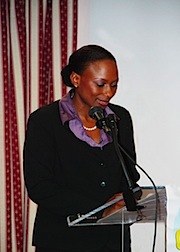CCSI'S RCP ON SHOW IN SURINAME
Early childhood development (ECD) and family support programmes are showing promising results in reducing and preventing youth violence and crime.
Participants and delegates who attended the Special Meeting of the Council of Human and Social Development (COHSOD) on Youth Development which took place in Suriname on January 28, 2010 got some insight into the workings of one such programme in the region the Roving Caregivers Programme (RCP). The RCP which has its origins in Jamaica and is being replicated by the Caribbean Child Support Initiative (CCSI), a programme of CARICAD, which was showcased in an Exhibition at the COHSOD meeting and at the Youth Summit which preceded it. The exhibition took place at the "Caribbean Knowledge Fair" on Tuesday January 26 and Wednesday 27, 2010 in the Congress Hall, Paramaribo. Research on chronic delinquency has identified several risk factors, prenatal difficulties, neurological and biological factors, low verbal ability, neighborhoods characterised by social disorganisation and violence, parental criminality and substance abuse, inconsistent and/or harsh parenting practices, low socioeconomic status, and exposure to media violence.
Researchers have however found that combination programmes addressing these multiple risk factors for delinquency and blending aspects of both family support and early childhood education are most promising in the prevention of chronic delinquency. The findings imply that the content of early childhood programmes should be such that they attempt to enhance parents social support, foster positive parenting and family interactions, facilitate child cognitive development (especially verbal skills), and reduce family level and community level poverty.
Taking the research findings into consideration, the CCSI has facilitated the replication and adaptation of the RCP concept which offers early stimulation for children as well as parenting education to five Caribbean countries. The RCP seeks to reach parents and children from birth to three years of age who do not have access to any formal early childhood education. As part of the initiative, educators/rovers are required to visit families at home, in their natural environment.
Given the focus on Youth Development at the summit, the CCSI sees this as an opportunity not only to showcase the various aspects of the RCP, but also to highlight the youth and their active engagement and involvement in informal early childhood development and family support services as well as community mobilisation and development, in their capacity as rovers.
The COHSOD meeting was convened as a preparatory meeting to the January 29, 2010 Special Summit of Heads of Government on Youth Development where CARICOM Heads will consider policy recommendations on youth development.

